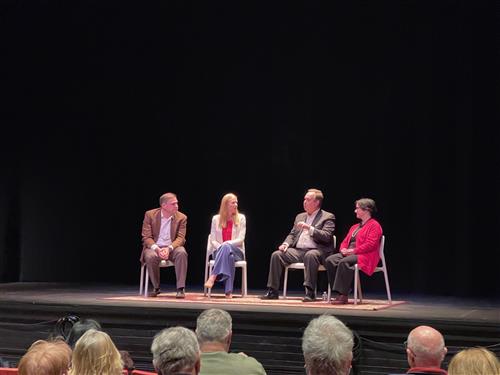- Roxbury Public Schools
- Social Studies 7-12
- Overview Social Studies 7-12
- Current Events, Articles, and Media
Academic Departments
Page Navigation
-
County Funds Planning for America's 250th Anniversary Celebration
Published on February 18, 2024 (from morriscountynj.gov)

Commissioner Director Christine Myers Announces Grant at “Travels with Darley” Screening
Hundreds gathered at the Morris Museum today for a sold-out, premier screening of “Travels with Darley: Revolutionary Road Trip New Jersey,” featuring three new episodes that focus on American Revolution sites in the state, including one in Morris County.
Morris County Commissioner Director Christine Myers told screening attendees that celebrating the 250th anniversary of America’s independence is not only important for the nation, but also will create opportunities to boost tourism and the local economy in historic Morris County.
“Our 250th is a great opportunity for our county. We invite everyone who wants to learn about the American Revolution to visit, explore, enjoy and learn how Morris County played in a role in establishing the best country the world,” said Director Myers, who was joined by Commissioners John Krickus, Deborah Smith and Tayfun Selen at the event.
She announced that the Morris County Board of County Commissioners have agreed to commit $100,000 in county funds to the Morris County Economic Development Alliance (MCEDAlliance) and the Morris County Tourism Bureau to coordinate 250th anniversary celebrations. The Commissioners also said they will make financial commitments for celebration planning in 2025 and 2026.
"We are grateful for the leadership and support from the County of Morris and the County Commissioners. It is through this partnership that the Alliance and Tourism Bureau is empowered to develop strong private-public partnerships which drive Morris County's tourism economy,” said Craig Schlosser, President & CEO of MCEDAlliance and the Tourism Bureau. “The announcement of the additional funding for the 250th will allow us to better leverage existing capabilities and develop new ones as we share our amazing communities with visitors from around the corner to around the world."
According to Schlosser, Morris County experienced 31 percent growth in tourism from 2021 to 2022, the 2nd highest percentage in the state per the New Jersey Department of Travel and Tourism.
“Travels with Darley: Revolutionary Road Trip Part II” highlights sites and local businesses throughout Morris County, including Jockey Hollow, the Ford Mansion, Schuyler-Hamilton House (aka the Campfield House) and Glen Brook Brewery in Morristown. Commissioner John Krickus was interviewed by show host, Darley Newman, on the historic Morristown Green when filming took place last summer.
The “Travels with Darley” screening was presented in partnership with Morris Museum, the American Battlefield Trust and the MCEDAlliance and Tourism Bureaus’ 250th Anniversary Committee, a planning group that includes Director Myers and Deputy Director Stephen Shaw.
Following the screening, the audience participated in a Q&A panel led by Tom Loughman, Executive Director of the Morris Museum, that featured Darley Newman, Sara Cureton, Director of the New Jersey Historical Commission and Jeffrey Vasser Executive Director of the New Jersey Division of Travel and Tourism.
Anyone interested in participating or learning more about ways to get involved with Morris County’s planning for the 250th anniversary should contact: 250@morriscountyalliance.org.
All three “Revolutionary Road Trips” episodes aired at the screening will premiere in primetime during “Travels with Darley’s” new season on NJ PBS.


